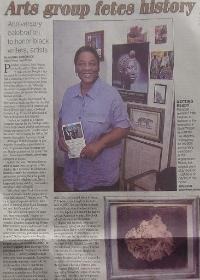|
| 
 Arts group fetes history Arts group fetes history
Anniversary celebration to honor black writers, artists
This story appeared in the Antelope Valley Press on Thursday, July 15, 2004.
By ALISHA SEMCHUCK
Valley Press Staff Writer Palmdale resident Linda Hughes labeled herself a "closet artist."
"I went out and bought a nice big easel. It's in the garage right now." But a collection of paintings and lithographs displayed throughout her home reveal her affinity for art. Although she created a couple of the pieces, she credited others for most of the African-themed artwork.
Currently Hughes finds herself elbow-deep in finalizing plans for the 30th anniversary celebration of International Black Writers and Artists, scheduled between Aug. 12 and 14 at Exposition Park in downtown Los Angeles.
Hughes, an English-as-a-Second-Language teacher for the Antelope Valley Union High School District and freelance writer, expects a sizable crowd to attend the event. "We're hoping for 500 to 600 people (during) the three-day period."
Although IBWA's founders in Los Angeles formed the organization in order to promote black literature and art, Hughes pointed out the group "has never been discriminatory, never been exclusive to blacks."
In fact, she said, "the most famous artist to come from our group is Tim Ashkar. He's Lebanese. In addition to creating scenery for television shows and motion pictures, the artist paints pictures with a religious slant, like a scene with Adam and Eve, and another showing a choir of angels.
"He (often) uses Greek themes and classical themes, but the people are always dark-skinned," Hughes said. "We try to appeal to people who are interested in learning about black literature and arts. So it's not just for us.
"But when it first started 30 years ago, there was a need," Hughes explained. When the group formed in Los Angeles, founders named it the Writers Improvement Charity and Social Club.
Back then, Hughes said, "African Americans were not published as much as now." So the organization largely focused on educating members who sought careers as writers and artists, essentially teaching them the ropes of the publishing world. "A lot of it was about excellence - what you need to do to make your work acceptable. Expression is extremely important, especially for blacks - the craft of it and the art."
The organization also educated members in another way. It gave them role models and mentors, informing them of blacks who had made it in the publishing world, though the numbers were relatively small and not well publicized at the time.
Hughes, who joined the group about four years after it formed, said she learned about the poet Phillis Wheatley, who was born in 1753 in Africa and sold into slavery at age 7 to a Boston family, where she cultivated her writing skills. She also learned about Madame C. J. Walker, a self-made millionaire, born in 1867. She entered the business world selling cosmetics door-to-door, then developed a pomade for the hair of African-American women. Sales took off and she amassed her fortune.
Hughes said she never even heard of these women during her years of studies in public school. But in acknowledging the accomplishments of these blacks, it gives others the hope that they too can succeed.
In fact, one workshop at the upcoming event is titled "Success Stories." The two scheduled presenters, Hazel Clayton Harrison and Eric Jerome Dickey, are examples of successful present-day writers. Hughes said they will discuss the sacrifices and rewards of a writer's career, though each followed a different path.
Hughes described Harrison as someone with a "moderate degree of success as a writer. But, she's her own person. She has a family she enjoys." Dickey, on the other hand, has a publicist who schedules his tours. "He doesn't have much time of his own." He has produced about seven or eight novels within seven years and been on the New York Times Bestseller List.
With experience in editing other people's work, Hughes feels ready to take on the challenge of drafting her own book.
But first she must get through the IBWA celebration, which has kept her and her daughter, Zerline Jennings, busy. But Hughes, 56, said, at this time in her life, busy is good. It keeps her mind off sorrow. Her husband, Douglas Howard Hughes, died about six months ago at 73.
"It was very sudden. He wasn't sick or anything," Hughes noted. "That's one of the reasons I'm working on this conference as much as I can."
asemchuck@avpress.com
|
|









